



The Samoyed originated from Siberia, and is part of the Northern, UKC, and Working, AKC groups. This breed gets its name from the Samoyed people, a nomadic tribe from the Siberian Tundra. The Samoyed was used as a hunter, herder of reindeer, and also as a sled dog.
Brief History
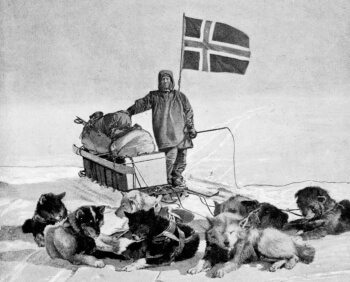
The Samoyed dog breed was bred to endure very cold conditions. This breed lived alongside the Samoyed people in tents, and endured temperatures as low as -60℃. During the nineteenth century and early twentieth century, western polar explorers discovered the dogs, and ended up bringing them home to the U.K. English aristocrats loved this breed. This breed then became popular with the English aristocrats. After that, the first Samoyed was imported to the U.S.
This breed was also used to explore the Arctic. The Samoyed was used by both American and European mushers during the early 20th century. These dogs hauled supplies, and were capable of sledging one and a half times their weight. Today, the Samoyed dog breed is very popular in the U.S and around the world.
Physical Description
The Samoyed is a medium-sized spitz dog breed that has a wedge- shaped head. With triangular prick ears, dark almond- shaped eyes, the Samoyed has a slightly upturned mouth, making this dog breed look like they smile. The nose is black, but sometimes also a liver-brown, or a Dudley nose. The Samoyed is longer than it is tall, and carries a tail that curls over its back or hangs down. This breed has a heavy double coat that is either white or biscuit in color. The Samoyed’s undercoat is thick and soft, with an outercoat that is long and course. This breed carries a ruff along its neck, and has a plumed tail. The legs are moderately long, and the chest deep. The Samoyed has heavy bone, but movement is not impeded by this, and the gait is strong and agile.
Temperament
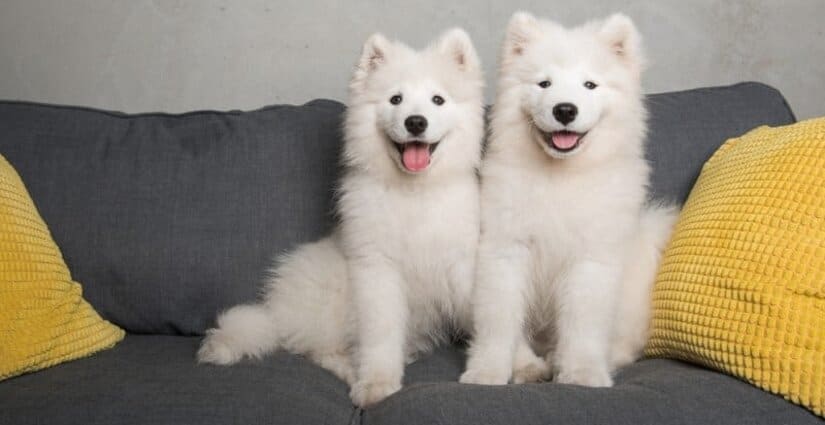
The Samoyed is intelligent, hardworking and active. This dog breed thrives on being with family, and needs positive dog training from puppyhood. Socialization needs to begin during the first four weeks of puppyhood where the Samoyed should be handled by different people, and introduced to other animals and different noises. During adolescence, the Samoyed may be rambunctious if not mentally stimulated. This dog breed is gentle and loyal, and is not aggressive.
Special Needs
The Samoyed needs plenty of attention and affection. This dog breed needs socialization, and positive dog training starting from puppyhood to avoid behavioral problems later on. The Samoyed needs to learn how to behave well inside and outside the home, trust strangers, and not be overly aggressive. This dog breed cannot be left alone at home all day, otherwise he’ll become afraid of all new things that he’s introduced to later on in life.
Samoyed puppies that are well socialized, will focus properly during positive dog training classes, be less anxious in new environments, and enjoy being other dogs and people. It’s also important that your Samoyed be introduced to children, and be allowed to play with them. Children should also learn not to disturb the Samoyed when eating, and not to carry him around, and not to hit or treat him badly. All children need to be calm around dogs, and show affection and kindness. That said, with socialization and positive puppy training, your Samoyed will learn how to live happily with people and other animals.
Possible Health Concerns
Samoyed’s have an adverse reaction to medications containing sulfa or sulfonamides.
The Samoyed is an active dog breed that may be susceptible to the following health conditions:
- Bloat: This breed is deep- chested, and thus more prone to bloat. Bloat is a life threatening emergency. It is caused by the twisting of the stomach, together with the accumulation of gas, with or without fluid. It is best to never elevate your Samoyed’s water and food bowls. Stress is also a major factor in causing bloat. Avoid feed your Samoyed a large meal, followed by exercise. At the first signs of dry vomiting, restlessness and discomfort, contact your emergency veterinarian. Don’t wait for a few hours. This is a true emergency that is life-threatening!
- Progressive Retinal Atrophy (PRA) is the name for a group of diseases that cause degeneration of the retina. This will include inherited abnormalities of the light- sensitive cells.
- Cardiac Diseases: Inherited cardiac diseases in the Samoyed like sub-aortic stenosis and cardiomyopathies are congenital (present at birth). Some symptoms may include heart murmurs resulting in exercise intolerance, and possible congestive heart failure. Consult with your veterinarian for advice.
- Vogt Koyanagi – Harada (VKH or VKH)–like syndrome is an autoimmune disease with symptoms of red, cloudy eyes, excessive tearing, sensitivity to light, and de-pigmentation of lips, nose, eyelids, and other black body parts of the Samoyed.
Exercise
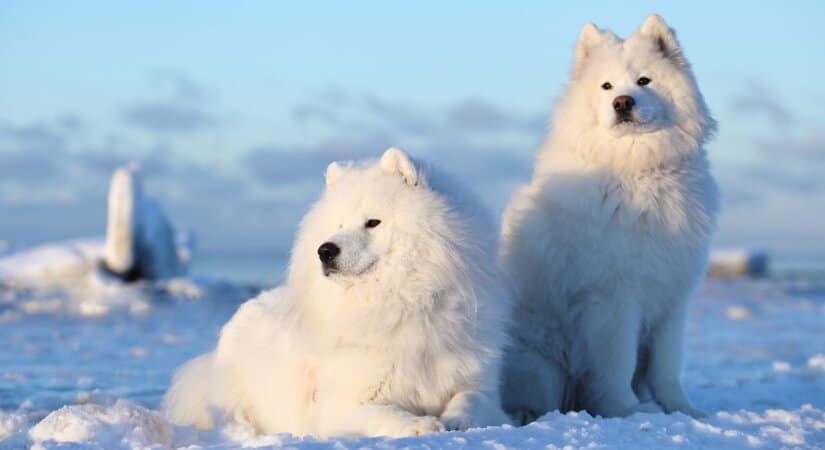
The Samoyed most enjoys family activities with their dog parents. This breed does well with regular exercise. Dog park playdates with other dogs, and trips to the dog beach help relax the Samoyed. Allow for the occasional Puppuchino from Starbucks! Your Samoyed will love this!
This dog breed enjoys canine sporting activities like Skijoring which is an adaptation of dog sledding. This is a fun cross-country skiing trek with mushers on skis. Sledding, obedience trials, Frisbee and lure coursing are other fun activities for the Samoyed. Additionally, running and hiking are wonderful everyday recreational activities that the entire family can enjoy together with the Samoyed.
Nutrition
A high-quality diet helps your Samoyed fight disease, grow correctly and age well. That said, with so many dog foods available, there are so many options. A high-quality dog food has the power to heal; yet that healing is totally dependent on the quality of the ingredients in each dog food recipe. Dog food recipes are also constantly changing, and it’s up to very dog parent to read the ingredient label carefully.
Here’s what to look for when choosing a high-quality dog food for your Samoyed:
- Look for dog foods that are tested using the AAFCO feeding trials instead of by formulation.
- Look for the nutritional adequacy statement that is required on all pet food labels.
- This label provides answers to three most important questions about your pet food.
- If it’s complete and balanced
- What life stage is it intended for? (Puppy, senior, etc.)
- How the claims on the label are substantiated?
If you’re wanting a natural, organic and holistic dog food, dry dog food brands offer many varieties – grain free, gluten free, vegetarian and traditional. Dry dog food is available through most pet food brands.
General ingredients that include whole meats, fruits or vegetables in their top 5 ingredients are considered good foods. Those that also incorporate antioxidants like blueberries, cranberries, pomegranates and pumpkin are also becoming popular. Additionally, organic, natural and preservative-free with no artificial ingredients, are also key to a well- balanced, and high quality dog food.
Dog parents, regardless of the breed need to understand that the life stage that a dog food is marketed for, may not be the same life stage for which the food actually meets the minimum requirements. Consult with your veterinarian if you need advice about which dog food to feed your dog.
Grooming
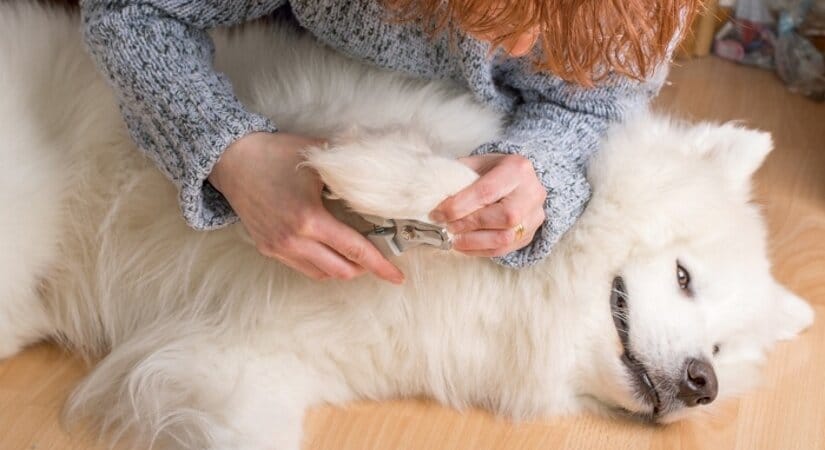
The Samoyed has a very thick double coat. That said, the Samoyed’s outer coat is thick and harsh, with a thick and wooly undercoat. Samoyeds shed all the time, but mostly during shedding season once or twice yearly. This breed needs to be brushed every day to remove loose hair and dirt. This also helps to prevent matts and tangles which can be worked through with a slicker brush or metal comb.
Teeth need to be brushed daily with a canine toothbrush and canine toothpaste. Ears cleaned regularly, and checked for sensitivity. Nails trimmed as needed. Your Samoyed will need to have a professional dental cleaning twice a year. Consult with your veterinarian for advice.
Adopting a Samoyed
Breeds like the Samoyed are wonderful additions to any home, especially those with children and other animals. This very sweet and social dog breed needs to be loved and treated with affection. In fact, they just love being everywhere with you. Samoyeds do not do well being left alone all day. They form a very strong bond with their dog parent.
Some normal behaviors may occur after adoption which may include digging holes, barking or perhaps being slightly depressed. Before adopting a Samoyed, find out about his past. Take your dog’s past history into account when figuring out quirky behavioral issues. If any behavior becomes excessive, consult your veterinarian.
Give your Samoyed time to adjust to his new surroundings, and entertain him with non-toxic, safe dog toys and healthy dog treats. This dog breed enjoys the comforting scent of people, most especially family, including children. As with any dog adoption, make sure that you have the time and resources to take good care of your Samoyed!
Samoyed Breeders in the USA
Rexann (Indiana)
- Address
- Elizabeth, IN 47117
- Website
- kbube.webs.com
- Phone
- (812) 969-3916
- kbbube@peoplepc.com
White Magic Samoyeds (Pennsylvania)
- Address
- York Springs, PA 17372
- Website
- www.whitemagicsamoyeds.com
- Phone
- (352) 360-8300
- samoyedpuppysales@gmail.com
Kenjo Samoyeds (Pennsylvania)
- Address
- Greentown, PA 18426
- Website
- kenjosamoyeds.com
- jpitino@ptd.net
O’blako Samoyeds (Pennsylvania)
- Address
- Doylestown, PA 18902
- Website
- oblakosamoyedkennels.com
- Phone
- (267) 640-3633
Heart String Kennels (Indiana)
- Address
- Millersburg, IN 46543
- Website
- heartstringhealthypuppies.com
- Phone
- (260) 200-8839
- Contact Form
New York Samoyeds (New York)
- Address
- Mount Upton, NY 13809
- Website
- nysamoyeds.com
- Phone
- (607) 376-7789
- contact@nysamoyeds.com
Breeders in the Canada
Snowstar
- Address
- 380 Green Road, Bonshaw, PE C0A 1C0
- Website
- www.snowstar-kennels.com
- Phone
- 9026752752
- snowstar98@gmail.com
SAMQ
- Address
- Saint-Raphaël, QC
- Website
- www.samoyedequebec.com
- Phone
- 4185737701
- samoyedequebec@hotmail.com
Super Sammy
- Address
- 6790 Blvd. Newman, LaSalle, QC
- Website
- supersammy.ca
- Phone
- 5145951738
- super.sammy312@hotmail.com
Kingmik Kennels
- Address
- Kemptville, Ontario
- Website
- www.kingmiksamoyeds.com
- Phone
- 6132589178
- karyne@kingmiksamoyeds.com
Hillset Kennel
- Address
- Manitoba, Mitchell
- Website
- hillsetkennel.com
- Phone
- 2042231778
- hillset@mail.com
Snow Crystal Samoyeds
- Address
- Lone Butte, BC
- Website
- snow-crystal-samoyeds.webnode.com
- Phone
- 7783630998
- snowcrystalsamoyeds@gmail.com
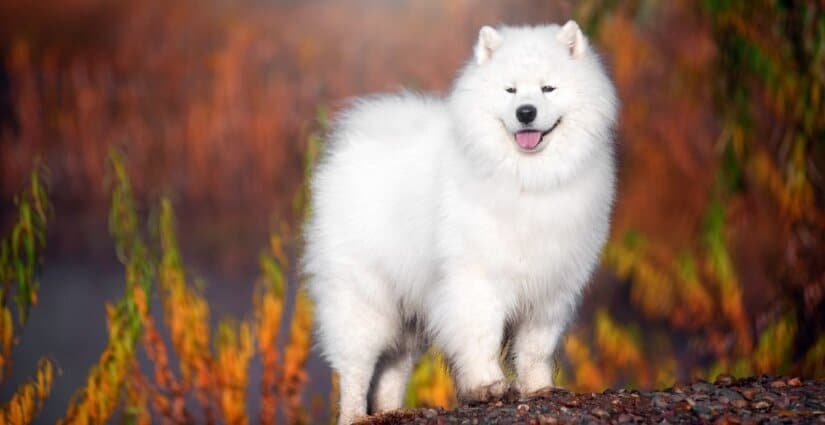
We are looking for a 6 week Samoyed pup. Having a difficult time finding a breeder, can you help. We are very knowledgeable about Samoyed😚 I had a Samoyed when I was in my teens. We also had a male Samoyed for 16 years, so we have proof, can you help.
I have a Sammy who is pulling & biting my clothes. he< 9 mo. old had training but still no improvment. Help!!
Hi Karen,
Although puppy biting is a natural behavior during puppyhood, it’s crucial to positively train your Sammy to stop biting and let him know what he is and is not allowed to chew. And that’s where dog chew toys come in handy with positive puppy training. When training your Sammy, keep in mind that positive reinforcement works best and that every time your puppy gets something right, you should reward him.
If your puppy makes a mistake, it’s just as important not to punish him but to ignore the error and set him up for success. You can teach your puppy to bite something else by redirecting him with a dog chew toy and not allowing him to chew on your clothes or hand.
You can also use a positive trainer to help you. Babyproofing your home works well, and you can also provide your Sammy with an assortment of colorful, interactive chew toys. Keep in mind that regular exercise, lots of off-leash trips to the dog park or beach will help you.
Teaching your puppy basic commands and the rules of the house is essential. Dogs that are obedience trained will be better behaved and will learn basic commands like drop it, sit, down, and stay. Be consistent with training and kind to your Sammy. In the long run, it will pay off. P.S You can also freeze your dog chew toys if your pup is teething.